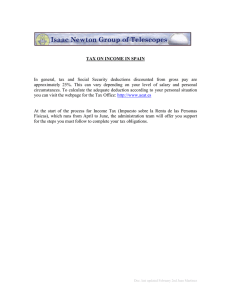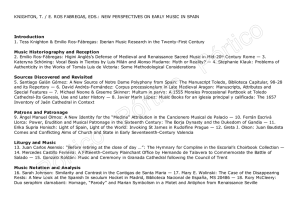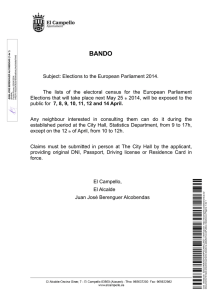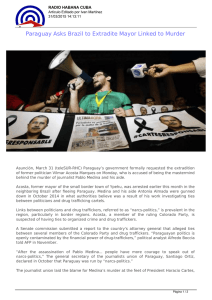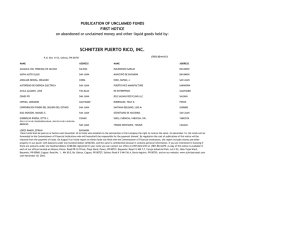Juan Emiliano O`Leary (1879
Anuncio
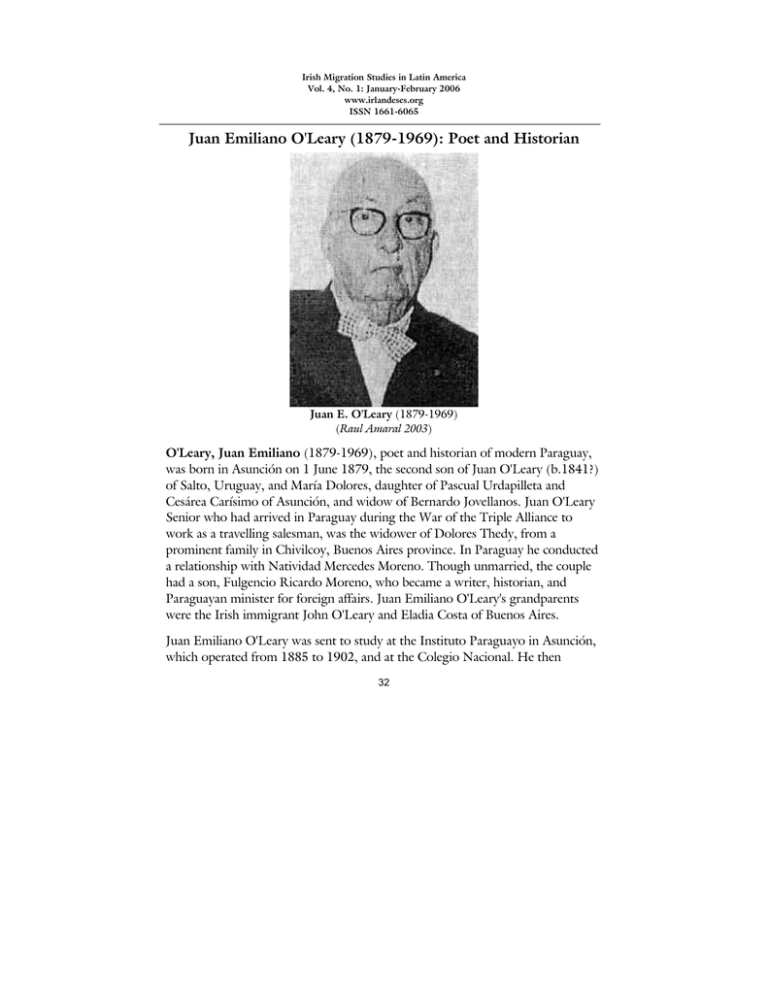
Irish Migration Studies in Latin America Vol. 4, No. 1: January-February 2006 www.irlandeses.org ISSN 1661-6065 Juan Emiliano O'Leary (1879-1969): Poet and Historian Juan E. O'Leary (1879-1969) (Raul Amaral 2003) O'Leary, Juan Emiliano (1879-1969), poet and historian of modern Paraguay, was born in Asunción on 1 June 1879, the second son of Juan O'Leary (b.1841?) of Salto, Uruguay, and María Dolores, daughter of Pascual Urdapilleta and Cesárea Carísimo of Asunción, and widow of Bernardo Jovellanos. Juan O'Leary Senior who had arrived in Paraguay during the War of the Triple Alliance to work as a travelling salesman, was the widower of Dolores Thedy, from a prominent family in Chivilcoy, Buenos Aires province. In Paraguay he conducted a relationship with Natividad Mercedes Moreno. Though unmarried, the couple had a son, Fulgencio Ricardo Moreno, who became a writer, historian, and Paraguayan minister for foreign affairs. Juan Emiliano O'Leary's grandparents were the Irish immigrant John O'Leary and Eladia Costa of Buenos Aires. Juan Emiliano O'Leary was sent to study at the Instituto Paraguayo in Asunción, which operated from 1885 to 1902, and at the Colegio Nacional. He then 32 Irish Migration Studies in Latin America Vol. 4, No. 1: January-February 2006 www.irlandeses.org ISSN 1661-6065 matriculated at the School of Law in Asunción. He actively participated in politics, supporting General Bernardino Caballero of the National Republican Association, the 'Partido Colorado', which dominated political life in Paraguay. O'Leary occupied key posts in the Party, as director of the National Archive, and later as a diplomatist. During a brief period he was foreign affairs minister in Alfredo Stroessner's administration. O'Leary's major contribution to Paraguayan historiography was his reappraisal of Francisco Solano López and of his role in the War of the Triple Alliance, known as the Guerra Guazú, or “Great War” to the Paraguayans,. Paraguay fought the Great War against Brazil, Argentina, and Uruguay from 1864 to 1870. Initially, and most likely under the influence of his family, O'Leary was bitterly critical of Solano López. He achieved renown on the basis of a less than flattering poem about the dictator during his studies at the Colegio Nacional. However, by the age of twenty-five O'Leary had concluded that Solano López's regime, though tyrannical and authoritarian, was beneficial to the country in the context of the aggressive foreign policies of its neighbours. Juan O'Leary depicted the Marshall as a great hero, a great patriot and a great promoter of nationalism. He was a close personal friend of Enrique Solano, son of the Marshall, and for this reason some accused O'Leary of partisan scholarship. Juan O'Leary distinguished himself as a pioneer of historical revisionism in Paraguay. The nationalist, and frequently overtly racist, views expressed in his narrative of Paraguayan history were effectively used by politicians to raise awareness of an indigenous identity among the population that remained after the catastrophic exactions of the Great War. Among his works of history are Páginas de historia (1916), Nuestra epopeya (1919), El Mariscal Solano López (1920), El Paraguay en la unificación argentina (1924), El héroe del Paraguay (1930), Los legionarios (1930), Apostolado patriótico (1933), Historia de la guerra de la Triple Alianza (1912) and Prosa polémica, published posthumously in 1982. By the turn of the twentieth century Juan O'Leary had become a member of a group of poets who used their writing as a method of reaffirming national identity. O’Leary’s name was linked with Rosicrán’s (Narciso R. Colman) Murray, Juan E. O'Leary (1879-1969) ....................................................................................33 Irish Migration Studies in Latin America Vol. 4, No. 1: January-February 2006 www.irlandeses.org ISSN 1661-6065 Guaraní renaissance. In the magazine Ocara Poty Cue-mi O’Leary encouraged readers 'to preserve our language; we must develop Guaraní and protect it from the corrupting and intrusive effects of Spanish'. Several of his poems are epic ballads about the Paraguayan war of independence and the war against the Triple Alliance. He also researched oral legends and narrated them in the form of short stories or epic poems. O'Leary published the following poetry books: El alma de la raza (1899), A la memoria de mi hija Rosita (1918), Salvaje (1902), Los conquistadores (1921), and several poetry anthologies in the Guaraní language. Juan E. O'Leary died on 31 October 1969 in Asunción. A street in the city and a district of Alto Paraná bear O'Leary's name. Edmundo Murray References - Amaral, Raul, Escritos Paraguayos (Asunción: Distribuidor Quevedo, 2003), vol. 1, pp. 112-117, 166-167. - Bareiro Saguier, Rubén and Carlos Villagra Marsal (eds.). Poésie paraguayenne du XXe siècle: édition trilingue en espagnol, français et guarani. Geneva: Patiño, 2003. - Wolf, Lustig. Chácore purahéi – Canciones de guerra: Literatura popular en guaraní e identidad nacional en el Paraguay. Mainz, 2005. Murray, Juan E. O'Leary (1879-1969) ....................................................................................34
